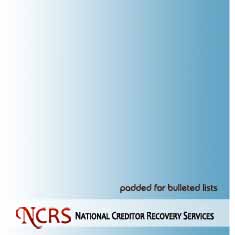Is There Something New in Preference Analysis
Is There Something New in Preference Analysis?
Could there actually be something new regarding the ordinary course defense in bankruptcy preferences? The answer is “Yes,” according to National Creditor Recovery Services President, Michael Newsom, who maintains the efforts to determine ordinary course of business can be better formulated. As a starting point, Newsom suggests that analysts have traditionally endeavored to show some relationship between the payment practice of the baseline pre‐preference period, and the ninety day preference period. Contends Newsom, this is not the primary relationship that needs to be characterized. What must be done to advance the understanding of what is ordinary, according to Newsom, is to determine the relationship between the baseline data and what constitutes the characteristics of actual settlements.
 To drive this assertion a little further, Newsom asks the following questions:
To drive this assertion a little further, Newsom asks the following questions:
- Is working with a precedent not a fundamental tool in asserting a legal position?
- If a Debtor has a preference case or many cases to pursue, wouldn’t it be beneficial for that attorney to be able to know of settlements of previous cases of some repute that shared some or all of the characteristics of the subject case?
- If having one case to refer to is a good thing, wouldn’t having over a thousand cases be much better?
- When a preference case is settled, isn’t the root of that settlement a direct, or at least an indirect, agreement on what is ordinary course?
- If these observations hold weight, then wouldn’t examining past settlements be a good idea?
The main theme of Mr. Newsom’s hypothesis is that while two informed minds might come to different conclusions on what is ordinary course in analyzing the transactions of a preference case, they will nonetheless use some similar thought processes to derive their respective conclusions. Therefore, identifying & measuring these common processes are the keys to defining ordinary course. Using these precepts, Newsom has been able to ascertain factors that can be used to replicate historical settlements with a striking degree of accuracy. He further suggests with some reservation, that this work provides a characterization of ordinary payment practice for which over a thousand attorneys have collectively agreed upon.
